Este post possui intencionalmente apenas imagens e códigos.

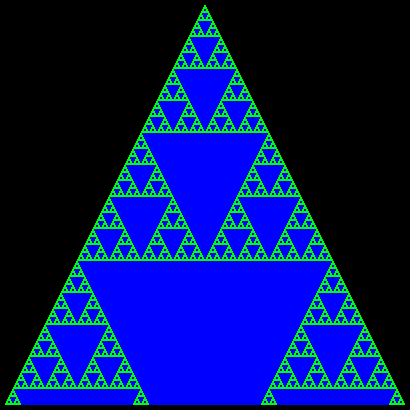
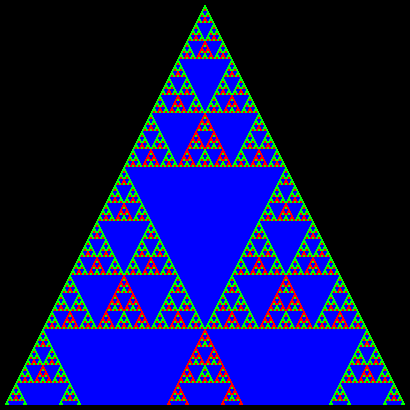
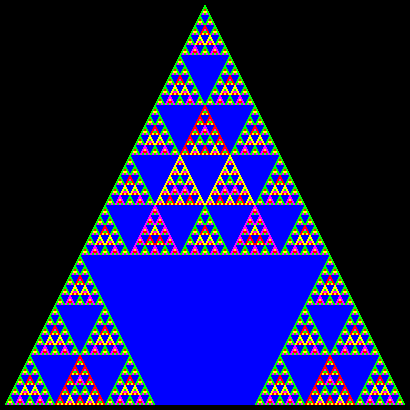
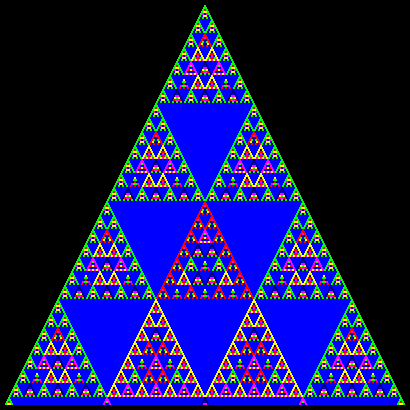
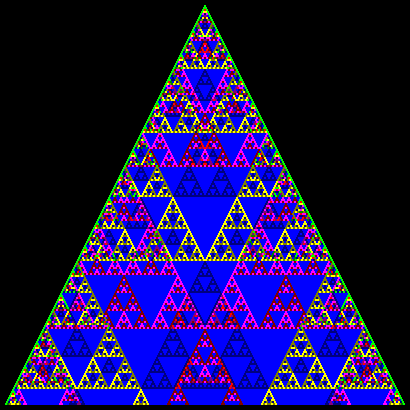
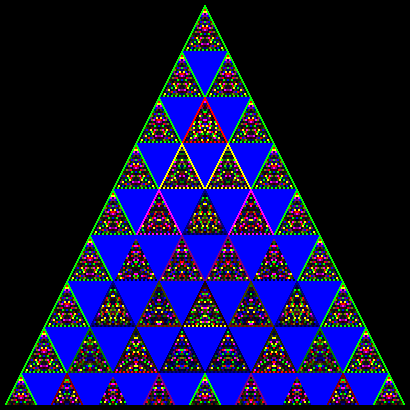
Código-fonte (com alguns bugs inofensivos — procure XXX)
/* pascal -- generate colored Pascal's triangles in XPM format
Copyright (C) 2011 Tiago Madeira <madeira@ime.usp.br>
This program is free software; you can redistribute it and/or modify
it under the terms of the GNU General Public License as published by
the Free Software Foundation; either version 3, or (at your option)
any later version.
This program is distributed in the hope that it will be useful,
but WITHOUT ANY WARRANTY; without even the implied warranty of
MERCHANTABILITY or FITNESS FOR A PARTICULAR PURPOSE. See the
GNU General Public License for more details.
You can read a copy of the GNU General Public License at
http://www.gnu.org/licenses/gpl-3.0.txt */
#include <stdio.h>
#include <string.h>
#include <stdlib.h>
#include <getopt.h>
#include <math.h>
#define DEFMOD 2
#define DEFSIZE 300
#define DEFPADDING 8
int mod = DEFMOD;
int size = DEFSIZE;
int padding = DEFPADDING;
char makecolors[6][4] = {
"001", "010", "100", "110", "101", "001"
};
struct option longopts[] = {
{"help", 0, 0, 'h'},
{"padding", 1, 0, 'p'},
{"size", 1, 0, 's'},
{"mod", 1, 0, 'm'},
{0, 0, 0, 0}
};
char *program_name;
void try_help() {
fprintf(stderr, "Try `%s --help' for more information.\n", program_name);
}
void help() {
printf("Usage: %s [OPTION]... [FILE]\n", program_name);
printf("Generate colored Pascal's triangles (XPM format).\n\n");
printf("Mandatory arguments to long options are mandatory for short options too.\n\n");
printf(" -h, --help print this help\n");
printf(" -m, --mod=M paint with different colors numbers mod M\n");
printf(" -p, --padding=SZ image padding (margin) in pixels\n\n");
printf(" -s, --size=SZ generate SZ lines of Pascal's triangle\n\n");
printf("With no FILE, or when FILE is -, write to standard output.\n\n");
printf("Report bugs to <madeira@ime.usp.br>.\n");
}
int baselog(int n, int base) {
return ceil(log(n) / log(base));
}
void *xmalloc(size_t size) {
void *x = malloc(size);
if (x == NULL) {
fprintf(stderr, "There is no enough memory to allocate.\n");
exit(3);
}
return x;
}
int main(int argc, char **argv) {
int optc, tofile;
int i, j;
int width, height, chars;
char **color, rgb[7];
int one, pos;
int *pascal;
char *line;
program_name = argv[0];
while ((optc = getopt_long(argc, argv, "hm:p:s:", longopts, (int *)0)) != -1) {
switch (optc) {
case 'h':
help();
return 0;
case 'm':
mod = atoi(optarg);
if (mod > 48) { /* XXX */
fprintf(stderr, "At the moment, this program supports only mod <= 48 (color generation limit).\n");
return 4;
}
if (mod > 26) { /* XXX */
fprintf(stderr, "At the moment, this program supports only mod <= 26 (bad implementation limit).\n");
return 5;
}
break;
case 'p':
padding = atoi(optarg);
break;
case 's':
size = atoi(optarg);
break;
default:
try_help();
return 1;
}
}
if (optind < argc && strcmp("-", argv[optind])) {
if (freopen(argv[optind], "w", stdout) == NULL) {
fprintf(stderr, "Can't open `%s' for writing.\n", argv[optind]);
return 2;
}
tofile = 1;
} else {
tofile = 0;
}
printf("static char *a_xpm[] = {\n");
width = size * 2 + padding * 2;
height = size * 2 + padding * 2;
chars = baselog(mod, 26);
printf(""%d %d %d %d",\n", width, height, mod + 1, chars);
color = xmalloc(sizeof(color[0]) * (mod+1));
rgb[6] = '�';
printf("\"");
color[mod] = xmalloc(sizeof(color[mod][0]) * (chars + 1));
for (j = 0; j < chars; j++) {
color[mod][j] = ' ';
}
color[mod][chars] = '�';
printf("%s c #000000\",\n", color[mod]);
for (i = 0; i < mod; i++) {
color[i] = xmalloc(sizeof(color[i][0]) * (chars + 1));
if (i == 0) {
for (j = 0; j < chars; j++) {
color[i][j] = 'a';
}
color[i][chars] = '�';
} else {
strcpy(color[i], color[i-1]);
for (j = chars-1; j >= 0; j--) {
if (color[i][j] == 'z') {
color[i][j] = 'a';
} else {
color[i][j]++;
break;
}
}
}
one = 255 / pow(2, i / 6);
sprintf(rgb, "%02x%02x%02x", makecolors[i%6][0] == '1' ? one : 0,
makecolors[i%6][1] == '1' ? one : 0, makecolors[i%6][2] == '1' ? one : 0);
printf("\"%s c #%s\",\n", color[i], rgb);
}
line = xmalloc(sizeof(line[0]) * (width+1));
pascal = xmalloc(sizeof(pascal[0]) * size);
line[width] = '�';
for (j = 0; j < width; j++) {
line[j] = ' ';
}
for (i = 0; i < padding; i++) {
printf("\"%s\",\n", line);
}
memset(pascal, 0, sizeof(pascal[0]) * size);
pascal[0] = 1;
for (i = 0; i < size; i++) {
for (j = i; j >= 0; j--) {
if (j != 0) {
pascal[j] = (pascal[j-1] + pascal[j]) % mod;
}
pos = padding + 2*j + (size - 1 - i);
/* XXX a implementacao de line ficou toda errada e so estou pegando
* o primeiro caractere de color aqui. precisa ser reescrito. */
line[pos] = line[pos+1] = *color[pascal[j]];
}
printf("\"%s\",\n\"%s\"%s\n", line, line, i == size-1 && !padding ? "" : ",");
}
line[width] = '�';
for (j = 0; j < width; j++) {
line[j] = ' ';
}
for (i = 0; i < padding; i++) {
printf("\"%s\"%s\n", line, i == padding-1 ? "" : ",");
}
printf("};\n");
if (tofile) {
fclose(stdout);
}
return 0;
}